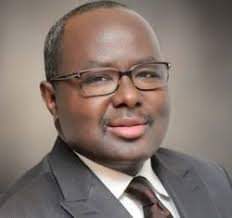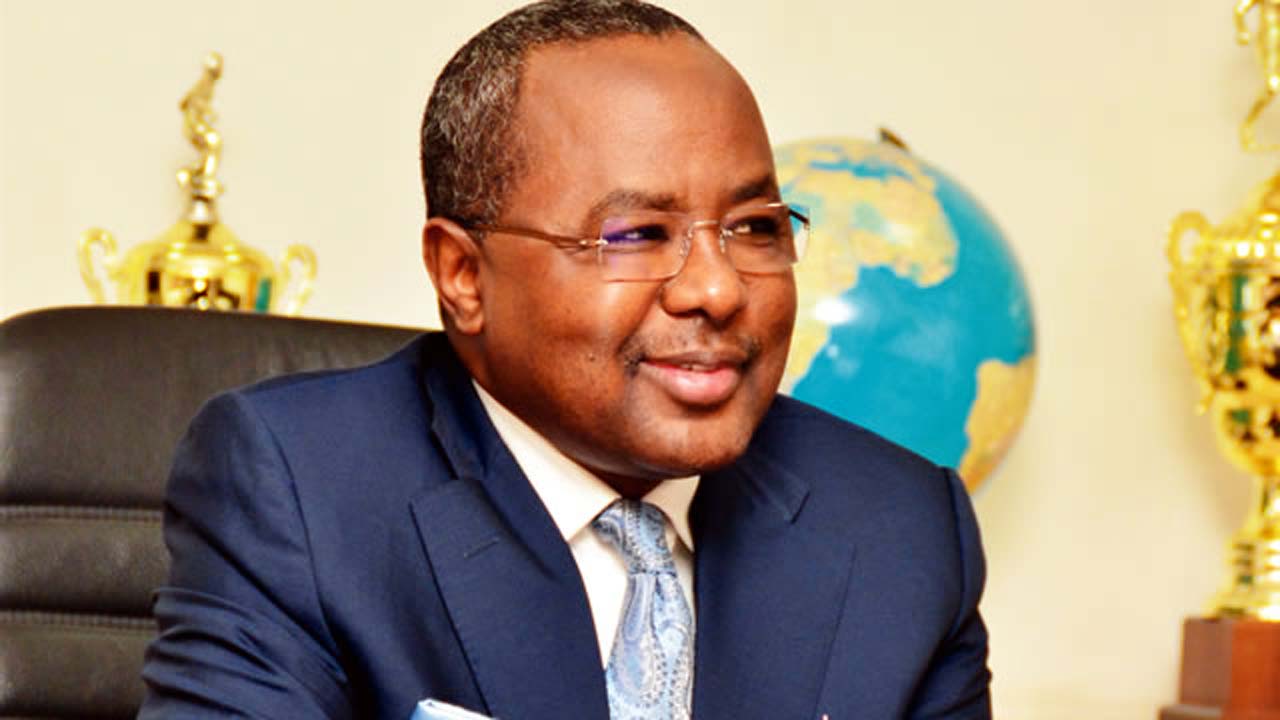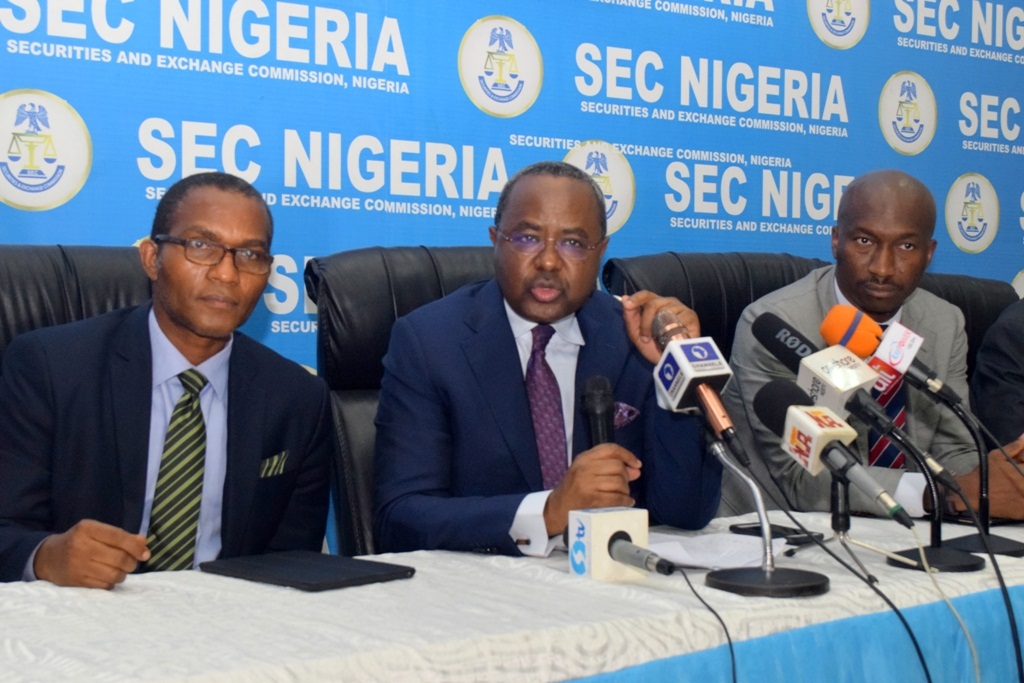Economy
SEC DG Insists ‘My Suspension by Adeosun Illegal’

By Dipo Olowookere
The suspended Director-General of Securities and Exchange Commission (SEC), Mr Mounir Gwarzo, has maintained that his removal from office in November 2017 by the Minister of Finance, Mrs Kemi Adeosun, did not follow due process.
Mr Gwarzo, while responding to a recent verdict of the House of Representatives Committee on Capital Market, which upheld his suspension, said the Minister erred in removing him from office without following the laid down rules.
The former capital market regulatory chief said if there was any arm of government that should be unhappy about the way and manner he was suspended, it should be the legislature “as the Minister of Finance acted against the provisions of ISA 2007 which is an Act of the National Assembly.”
In a statement personally signed by him, Mr Gwarzo said only President Muhammadu Buhari, who appointed him into office, has the power to remove him.
Below is his full letter.
Recent decisions by the Federal House of Representatives (The House) with respect to their public hearing and investigations on the cases against the Executive Secretary of the National Health Insurance Scheme (NHIS), some Directors of the National Emergency Management Agency (NEMA) and that against me with respect to my suspension as the Director General of the Securities and Exchange Commission (SEC) are puzzling.
The House had at its sitting on the 18th of April 2018 while adopting the report of its Committee on Capital Market and Institutions headed by Rep Tajudeen Ayo Yusuf said that I indeed has a case to answer and that the Minister of Finance Kemi Adeosun was right to have suspended me it therefore stated that “the suspension of the Director General of SEC, Mounir Gwarzo stands”.
I was suspended by the Minister of Finance Mrs. Kemi Adeosun on 29thNovember 2017. She based the suspension on petitions of corrupt practices and breaches of the public service rules levelled against me. However, at a public hearing before the House Committee on Capital Market and Institutions on January 30th, 2018, I noted that not only was due process not followed by the Minister prior to the suspension, she also lacked the authority to suspend me as this power lies solely on the President of the Federal Republic of Nigeria based on her recommendation and upon the confirmation from the senate as clearly captured in S5 (1) ISA 2007 which states that “the Director-General and the three full time Commissioners shall be appointed by the President upon the recommendation of the Minister and confirmation by the Senate.”
As S11 (1) of the Interpretation Act clearly states as follows, “Where an enactment confers a power to appoint a person either to an office or to exercise any functions, whether for a specified period or not, the power includes –
(a) power to appoint a person by name or to appoint the holder from time to time of a particular office;
(b) power to remove or suspend him.
The Minister in her letter based my suspension pursuant to the provisions of the Nigerian Public Service Rules (PSR) namely PSR 03405 and PSR 03406 however as I informed the public hearing, these provisions do not exist in Nigeria’s Public Service Rules and as we all know you can’t build something on nothing. What exist are PSR 030405 and PSR 030406.PSR 030405 merely provides for the responsibility of an interdicted officer or officer under suspension to make notification of his intention to leave his station or the country. While PSR 030406 requires a prima facie case to be established against an officer before he could be suspended. In my case,a prima facie case is yet to be established against me although I was invited by the Independent Corrupt Practices Commission (ICPC) after my suspension.Also, the Minister only set up an Administrative Panel after my suspension inviting me to appear on 8 January 2018 over the same subject matter.
Furthermore, according to PSR 160103, the PSR would only apply to the SEC DG or any staff of SEC in the absence of any statute, manual, rules, procedures and practices regulating the Securities and Exchange Commission and its staff. It is important at this point to state that my letter of appointment as the DG specifically referred to the ISA 2007 – an Act of the National Assembly as the law governing my conditions of service. Thus all actions relating to my appointment must be in compliance with the ISA as anything outside same would amount to a nullity.
However, the same House on the recommendation of its Committee on Emergency and Disaster Preparedness would at a sitting on the 20th of April 2018 direct the recall of the suspended Directors of NEMA because according to the Deputy Chairman of the Committee Hon. Ali Isa, investigations had shown that due process was not followed in their suspension and this is even after the Acting Chairman of the Economic and Financial Crimes Commission (EFCC) informed The House that NEMA had based the suspension of the Directors following a recommendation by EFCC who had carried out investigations against the Directors following a petition they received in December 2017and had found them wanting.
A member of the Committee Hon. Gabriel Onyewife also noted that in the case of NEMA there was no evidence of fair hearing and no final judgement had been passed against them as investigation was still in progress, this position was supported by the Speaker of the House, Hon. Yakubu Dogara who said that it was wrong to suspend someone without an opportunity for fair hearing.
In the case of the Executive Secretary NHIS who was suspended by the Minister of Health (but was reinstated 6 months later by the President of the Federal Republic of Nigeria) while investigations against him were still ongoing, and before the release of the report of the Public Hearing by the House of Representatives Committee on Health Services, the Chairman of the Committee Hon. Chike Okafor immediately moved a motion for his protection and immediate recall.
From the above it is obvious that the position of the House that my suspension as the DG, SEC was in order on the mere ground that I had a case to answer when it is clearly obvious that due process was not followed in my caseleaves a lot to be desired.
Recently, the Federal Government through the Office of the Secretary to the Government of the Federation, in the case of the purported suspension of the Director-General, National Women Development Centre, carried out by the centre’s Governing Board which the Federal Government termed as an illegal act and directed the DG to resume her duties immediately.
Part of the statement read as follows, “The Boards and Chief Executive Officers are all appointed by Mr. President, according to stated terms and conditions with clearly established rules and procedures for subjecting Chief Executive Officers to disciplinary measures including suspension from office. In this respect, this process has not been followed.
Government believes in due process, and will not tolerate any arbitrary action taken by any Board of any Federal Government Agency.”
Finally if there is any arm of Government that should be unhappy about the way and manner I was suspended it should be the Legislature as the Minister of Finance acted against the provisions of ISA 2007 which is an Act of the National Assembly.
Mounir Gwarzo
Abuja, Nigeria
Economy
NGX RegCo Cautions Investors on Recent Price Movements

By Aduragbemi Omiyale
The investing public has been advised to exercise due diligence before trading stocks on the Nigerian Exchange (NGX) Limited.
This caution was given by the NGX Regulation Limited (NGX RegCo), the independent regulatory arm of the NGX Group Plc.
The advisory became necessary in response to notable price movements observed in the shares of certain listed companies over recent trading sessions.
On Monday, the bourse suspended trading in the shares of newly-listed Zichis Agro-allied Industries Plc. The company’s stocks gained almost 900 per cent within a month of its listing on Customs Street.
In a statement today, NGX RegCo urged investors to avoid speculative trading based on unverified information and to consult licensed intermediaries such as stockbrokers or investment advisers when needed.
It explained that its advisory is part of its standard market surveillance functions, as it serves as a measured reminder for investors to prioritise informed and disciplined decision-making.
The notice emphasised that the Exchange will continue to monitor market activities closely in line with its mandate to ensure a fair, orderly, and transparent market.
“NGX RegCo encourages all investors to base their decisions on publicly available information, including a thorough assessment of company fundamentals, financial performance, and risk profile,” a part of the disclosure said.
It reassured all stakeholders that the NGX remains stable, well-regulated, and resilient, saying the platform continues to foster an environment where investors can participate with confidence, supported by robust oversight and transparent market operations.
“Our primary responsibility is to maintain a level playing field where market participants can trade with confidence, backed by timely and accurate information.
“This advisory is a routine communication, reinforcing that sound fundamentals, not speculation, remain the foundation for sustainable investment outcomes. We are fully committed to preserving the integrity and stability of our market,” the chief executive of NGX RegCo, Mr Olufemi Shobanjo, stated.
Economy
Stronger Taxpayer Confidence, Others Should Determine Tax Reform Success—Tegbe

By Modupe Gbadeyanka
The chairman of the National Tax Policy Implementation Committee (NTPIC), Mr Joseph Tegbe, has tasked the Nigeria Revenue Service (NRS) to measure the success of the new tax laws by higher voluntary compliance rates, lower administrative costs, fewer disputes, faster resolution cycles, and stronger taxpayer confidence.
Speaking at the 2026 Leadership Retreat of the agency, Mr Tegbe said, “Sustainable revenue performance is built on trust and efficiency, not enforcement intensity,” emphasising that the legitimacy and predictability of the system are more critical than punitive measures.
He underscored that the country’s tax reform journey is at a critical juncture where effective implementation will determine long-term fiscal outcomes.
The NTPIC chief stressed that tax policy must serve as an enabler of governance, and should embody simplicity, equity, predictability, and administrability at scale.
These principles, he explained, foster voluntary compliance, reduce operational friction, and strengthen investor confidence. He warned that ad-hoc adjustments or policy drift could undermine reform momentum, unsettle businesses, and deter investment, which thrives on predictable rules rather than shifting announcements. Structured sequencing, clear transition mechanisms, and continuous feedback between policymakers and administrators are therefore critical to sustaining reform credibility.
Mr Tegbe further argued that revenue reform cannot succeed in isolation. Achieving sustainable gains requires a whole-of-government approach, leveraging robust taxpayer identification systems, integrated financial data, efficient dispute resolution, and harmonised coordination across federal and sub-national levels. This approach, he said, reduces leakages, eliminates multiple taxation, and reinforces confidence in the system.
He noted that the passage of four new tax laws marks only the beginning of a broader reform agenda, describing the initiative as a systemic recalibration of Nigeria’s fiscal architecture, rather than a routine policy update.
He further asserted that the true measure of success will be the credibility of implementation, not the design of the laws themselves.
The NRS, he noted, functions as the nation’s “Revenue System Integrator,” with outcomes reflecting the strength of an interconnected ecosystem that encompasses policy clarity, enforcement consistency, digital infrastructure, dispute resolution efficiency, and intergovernmental coordination.
Economy
NUPENG Seeks Clarity on New Oil, Gas Executive Order

By Adedapo Adesanya
The National Union of Natural and Gas Workers (NUPENG) has expressed deep concern over the Executive Order by President Bola Tinubu mandating the Nigerian National Petroleum Company (NNPC) Limited to remit directly to the federation account.
In a statement signed by its president, Mr William Akporeha, over the weekend in Lagos, the union noted that the absence of detailed public engagement had naturally generated tension within the sector and heightened restiveness among workers, who are anxious to know how the new directive may affect their employment, welfare and job security, especially as it affects NNPC and other major operations in the oil and gas sector.
It pointed out that the industry remained the backbone of Nigeria’s economy, contributing significantly to national revenue, foreign exchange earnings, and employment.
The NUPENG president affirmed that any policy shift, particularly one introduced through an Executive Order, has far-reaching consequences for regulatory frameworks, Investment decisions, operational standards, and labour relations within the sector.
According to him, “there is an urgent need for clarity on the scope and objectives of the Executive Order -What precise reforms or adjustments does it introduce? “Its implications for the Petroleum Industry Act -Does the Order amend, interpret, or expand existing provisions under PIA?
“Impact on workers and existing labour agreements-Will it affect job security, conditions of service, Collective Bargaining agreements or ongoing restructuring processes within the industry? “Effects on indigenous participation and local content development -How will it affect Nigerian companies and employment opportunities for citizens?”
He warned that without proper consultation and explanation, misinterpretations of the Executive Order may spread across the industry, potentially destabilising operations and undermining industrial harmony that stakeholders have worked hard to sustain.
“Though our union remains committed to constructive engagement, national development and stability of the oil and gas sector, however, we are duty-bound and constitutionally bound to protect the rights and welfare and job security of our members whose livelihoods depend on a clear, fair and predictable policy framework,” Mr Akporeha further stated.
-

 Feature/OPED6 years ago
Feature/OPED6 years agoDavos was Different this year
-
Travel/Tourism10 years ago
Lagos Seals Western Lodge Hotel In Ikorodu
-

 Showbiz3 years ago
Showbiz3 years agoEstranged Lover Releases Videos of Empress Njamah Bathing
-

 Banking8 years ago
Banking8 years agoSort Codes of GTBank Branches in Nigeria
-

 Economy3 years ago
Economy3 years agoSubsidy Removal: CNG at N130 Per Litre Cheaper Than Petrol—IPMAN
-

 Banking3 years ago
Banking3 years agoSort Codes of UBA Branches in Nigeria
-

 Banking3 years ago
Banking3 years agoFirst Bank Announces Planned Downtime
-

 Sports3 years ago
Sports3 years agoHighest Paid Nigerian Footballer – How Much Do Nigerian Footballers Earn















